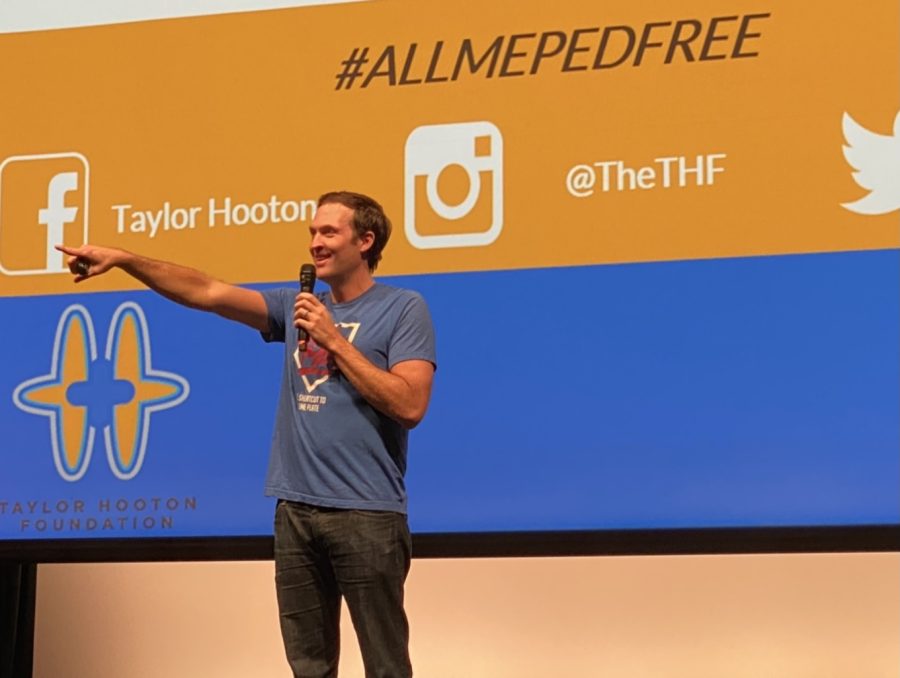ALL ME Assembly educates on performance-enhancing substances
Taylor Hooton Foundation offers free presentation on Feb. 3
THF’s Brian Parker opens the presentation by explaining the history of the foundation and his personal connection to substance abuse.
February 4, 2022
At 7 p.m. on Thursday, Feb. 3, athletes, parents, coaches, and students gathered in the Performing Arts Center for an hour-long presentation by Taylor Hooton Foundation director of education Brian Parker. The assembly discussed the rise in use of performance-enhancing substances, various types of common substances, and why and how teenagers are affected.
“Steroids are more dangerous than I thought. I realized that [steroids] are now being used in our regular lives,” senior Leticia Nagitta said.
THF was founded after the passing of high school baseball pitcher Taylor Hooton, who died by suicide in 2003 at the age of 17. Hooton had been recommended anabolic steroids to gain muscle ahead of the baseball season but was then told to stop using them immediately by his doctor, which led him to become deeply depressed.
“We lost somebody because of [substances], and every day since that has happened we’re trying to prevent the situation for other families,” Parker said. “My end goal is education.”
Since its establishment in 2004, the foundation has spoken to over two million people and become a national leader on the subject. THF’s ALL ME program has connected with 50 professional athletes to encourage students to find success without performance-enhancing steroids and supplements.
“There’s a push that they’re trying to make, even with professional athletes, to say that my accomplishments are ‘all me’ [and] not having to do with any performance-enhancing substances,” medical academy teacher Renae St. Clair said. “If I do well, it’s all me that’s doing well.”
After St. Clair entered and won a contest by the foundation that offered 10 schools a grant for a free presentation, she invited Parker to speak at Huntley High School. As an athletic trainer, she understood the risks involved in using anabolic steroids and substances like unregulated protein powders and energy drinks. According to St. Clair, there has been a rise in the popularity of such drinks among athletes and young women, typically for appearance purposes.
“[Students] know a lot about the food pyramid… but I don’t think people really have any idea when it comes to this supplement and energy drink realm. It’s kind of new,” St. Clair said.
The assembly revealed that 12.3 million middle and high school students use performance or appearance-enhancing substances, with 10.8 years old as the average starting age.
In order to avoid harmful substances, Parker recommends checking protein bars, shakes and powders for labels like the National Science Foundation seal and other purity-ensuring symbols.
“The biggest problem I have with supplements right now is that there is very little regulation. It’s an honors system,” Parker said.
Then, teenagers should ask themselves if it is necessary that they take the substance and make sure they are using the correct dosages. Without these steps, there is a risk of unconsciously ingesting steroids and other drugs.
“I really liked [the presentation]. I thought it was good information that people should know. For volleyball, I’ve had a protein shake before and protein bars. No one really knows what’s in them, [so] I think this was a really good learning experience for anybody,” medical academy senior Carly Stinger said.
For more information on performance-enhancing substances and the ALL ME Assembly, visit the Taylor Hooton Foundation website or check out the ALL ME podcast.
“This is a subject matter people actually want to know about or are curious about, but they haven’t felt comfortable talking to people about it or asking those questions,” Parker said. “We [have] to have this discussion because what’s it going to be like in 20 years if we don’t?”



